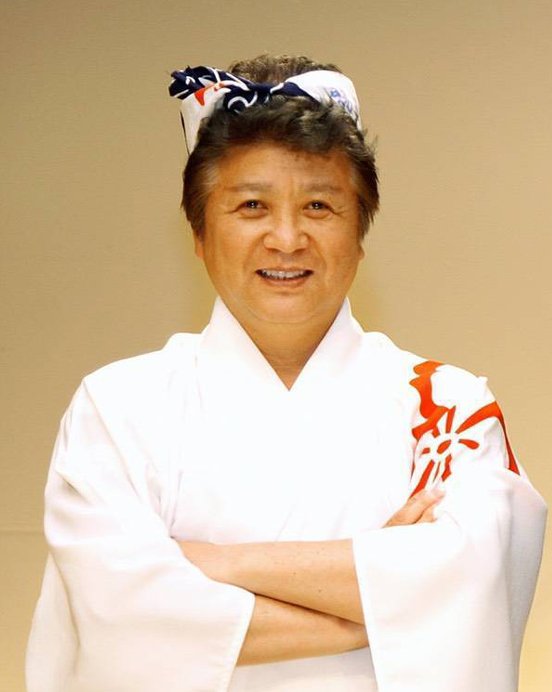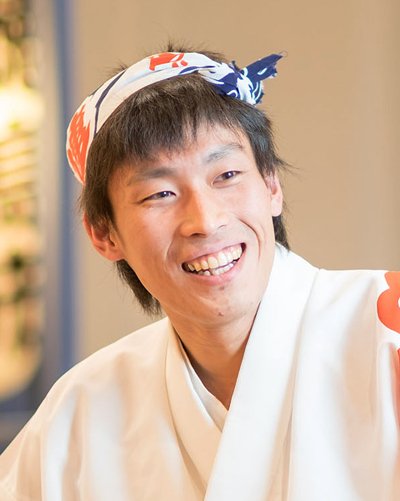Grand Opening of New Dojo, AIRMW Cultural Hub
Tatsu Aoki’s Dream Starts at the Moment
Tatsu Aoki (R) and special guests break a barrel of Japanese sake to celebrate Grand Opening of AIRMW Cultural Hub
Grand Opening Celebration of the Asian Improv aRts Midwest’s new building “AIRMW Cultural Hub” was held on February 24. The place is also called “Dojo” where regular rehearsals and classes of traditional Japanese arts under the Asian Improv aRts Midwest (AIRMW) are held. Those traditional arts are Tsukasa Taiko, Shubukai, and Toyoaki Shamisen which perform Japanese taiko drumming, Japanese classical dance and three-string-musical instrument, respectively. This new Dojo is also used as a cultural event venue and invites artists and performers.
Located at 4875 N. Elston Avenue in Chicago’s north side, south-east corner of Elston Ave. and Kentucky Ave., visitors of the Dojo easily find parking spaces around the building. It’s a perfect location for a cultural hub.
AIRMW used to have rehearsals at the Japanese American Service Committee (JASC); however, JASC has a plan to move itself to other location, so Tatsu Aoki, Director of AIRMW, decided to have his own Dojo and started fundraising in 2019. Things were not easy due to outbreak of COVID-19 and uncertainty of the future, but Aoki’s efforts were finally paid off.
Kiku Taura (L) and Lori Ashikawa play shamisen to welcome guests.
On the Grand Opening day, guests were welcomed by shamisen music played by Kiku Taura and Lori Ashikawa from Toyoaki Shamisen.
Special Guests were Hiroshi Tajima, Consul General of Japan in Chicago; Alderman Samantha Nugent (Ward 39); Amie Zander, Executive Director, Pulaski Elston Business Association; AIRMW’s Board Representatives; Funder Toshio Ogino, Koh Fujimoto and more.
The opening ceremony started with Tsukasa Taiko’s performance “Miyake” followed by a dance piece “Hayama no Ichiban”, which was danced and choreographed by Shubukai’s Grandmaster Yoshinojo Fujima.
Wishing for AIRMW’s good luck and prosperity, a barrel of Japanese sake was broken by the special guests. It is called Kagami-biraki, a ceremony performed to celebrate a congratulatory occasion.
Tatsu Aoki, Director of AIRMW
In his opening remarks, Tatsu Aoki expressed his gratitude by calling each funder’s name and said that the idea of AIRMW Cultural Hub was realized and opened because of many organizations, who gave grants; individuals, who made donations; and AIRMW’s members, their families and friends, who supported to build the new Dojo.
Consul General Hiroshi Tajima congratulated Tatsu Aoki and AIRMW saying that he was delighted to witness this momentous occasion and shared his warmest wishes with Aoki, the founder of the organization and his team.
Consul General Hiroshi Tajima
He also thanked Aoki for being an important partner of the Consulate General of Japan in Chicago to support and contributing to cultural events and programs hosted by his Consulate and said, “Their steadfast commitment to promoting and preserving traditional Japanese music, art, and culture has made a significant impact on the community.”
Consul General Tajima looked around the new Dojo and said, “This new space will undoubtedly become a hub of creativity and innovation, where artists and performers from diverse backgrounds can come together to share their talents, collaborate, and inspire one another.”
He continued to say, “I would like to express my heartfelt appreciation and deep respect to Mr. Tatsu Aoki for his long-lasting commitment to promoting Japanese traditional music and culture in the United States. His leadership and vision have inspired countless individuals, and his legacy will undoubtedly continue to shape the cultural landscape for many years to come.”
Interview with Tatsu Aoki
Q: You made your dream come true, didn’t you?
Aoki: Actually my dream starts today. I’m really grateful to have this Dojo because I was thinking that Tsukasa Taiko, Shubukai and Toyoaki Shamisen should have it for a long time.
Tsukasa Taiko plays Miyake at Grand Opening
Q: It’s really a good spot that people can access here easily.
Aoki: Yes. We play taiko drumming and music, so I had been looking for a single building for two and a half year. I finally found this one and closed a deal little over a year ago, and then we worked for renovation. We are lucky because of recent skyrocketing-rent fee for this size of space although we paid higher renovation cost than pre-pandemic era.
Q: How did you fund to open this Dojo?
Aoki: Our fundraising Dojo Campaign started in 2019, but COVID-19 pandemic hit us soon. So our campaign stagnated for about a year and a half. However, grant programs from Illinois, City of Chicago and private foundations, and donations from individuals greatly helped making it possible to purchase this building. I really appreciate their generous supports, so we carry all of the funders’ logo in our banner.
Yoshinojo Fujima performs Hayama no Ichiban
Q: Could you talk about the future plans of this Dojo?
Aoki: We have all the classes of Tsukasa Taiko, Shubukai and Toyoaki Shamisen in this Dojo. We’ll have a variety of contemporary art events here. We are planning to hold a program, “Artist Talk” where artists can talk about their artworks. We also welcome Asian American organizations to use this Dojo.
We have people who have been practicing musical instruments or dancing here as their hobby. At the same time we have artists, who have professionalism, here in this Dojo. So those people get together to work for arts and performance in the community and enjoy real fun and resonance of arts here in this Dojo. This is my dream starting from today.
Awa Odori Workshop Held in AIRMW Cultural Hub
AIRMW launched “Japanese Folk & Festival Dance” as a subprogram of Shubukai three years ago. It is an exchange program of Japanese folk dances such as Bon dancing and Awa Odori, and AIRMW has been collaborating with local dance organizations in Shizuoka and Tokushima Prefecture in Japan.
The program “Japanese Folk & Festival Dance” puts its purpose to follow the original aesthetics and traditional pedagogue, not learning from digital media such as YouTube. It is the same basics of taiko drumming, shamisen and Japanese classical dance under the AIRMW.
After the grand opening of AIRMW Cultural Hub, Shubukai welcomed Minoru Yamada and Yuusuke Takashima, leader and musician of Awa Odori organization “Tensuiren” in Tokushima Prefecture and held two workshops.
The first workshop was held in Links Hall on March 15, and the second one was in the Cultural Hub on March 18. The events were co-organized by Shubukai and Chicago Awa Odori Project led by Emi Asakawa.
Workshop in Links Hall
Links Hall is a place for performing artists to explore and create contemporary or experimental dance, and the people of the dance industry came to see Awa Odori performed by Yamada and Takashima. A lecture on Awa Odori was also offered.
Shubukai’s grandmaster Yoshinojo Fujima, a residency of Links Hall, said the workshop was the best chance to introduce authentic Awa Odori to Chicago’s dance industry. She thinks that aesthetics of dance movement is learned from direct instruction by her teacher, and dancing skills are obtained by repeated training and practice under her teacher. She said it is the authentic aesthetics of the dance performing art.
Yoshinojo has been working to create five dance pieces and wants to employ blend of movements from Awa Odori and Bon dancing to her choreography.
Workshop in AIRMW Cultural Hub
Awa Odori workshop at AIRMW Cultural Hub on March 18, 2023 (Photo: courtesy of AIRMW)
Awa Odori workshop at AIRMW Cultural Hub was mainly Awa Odori live performance with live music of “Zomeki Bayashi” by Minoru Yamada and Yuusuke Takashima.
Yoshinojo said Awa Odori was repetition of simple movements, but it has aesthetic skills which cannot be learned by mocking the movements.
Minoru Yamada, Leader of Tensuiren, instructs participants how to dance Awa Odori. (Photos of Tensuikai: courtesy of AIRMW)
Tensuiren’s Leader Yamada started Awa Odori at age of four, about 70 years ago. He is the fourth Leader of the Tensuiren which celebrated its 70th anniversary several years ago. Yoshinojo carefully observed Yamada’s movements and was impressed by his stable foot works and whole body movements which were obtained by decades of training.
Yamada was not only a great performer, but also a good instructor. After watching a video of special performances at the 70th anniversary, Yamada taught the audience how to dance Awa Odori in a simple and easy way. It was a great opportunity to learn directly from skillful Awa Odori dancer.
Yoshinojo said, “We cannot learn traditional Japanese arts directly from teachers as Japanese people do, but it is important to make effort to learn authentic skills from teachers in Japan. To do so, we need dance exchanges with Japanese traditional performing artists.”
Shubukai’s program “Japanese Folk & Festival Dance” has also worked with Kimiei Fujima in Shizuoka Prefecture to introduce Bon dancing. Shubukai has collaborated with Chicago Park District, Chicago DCASE, Chicago Dancemakers Forum, Japanese Arts Foundation and Japanese Culture Center to host many events in the Chicago area including Jackson Park and Millennium Park. This year the program is going to bring new Bon Odori themed on Chibimaruko, popular anime character in Japan.










